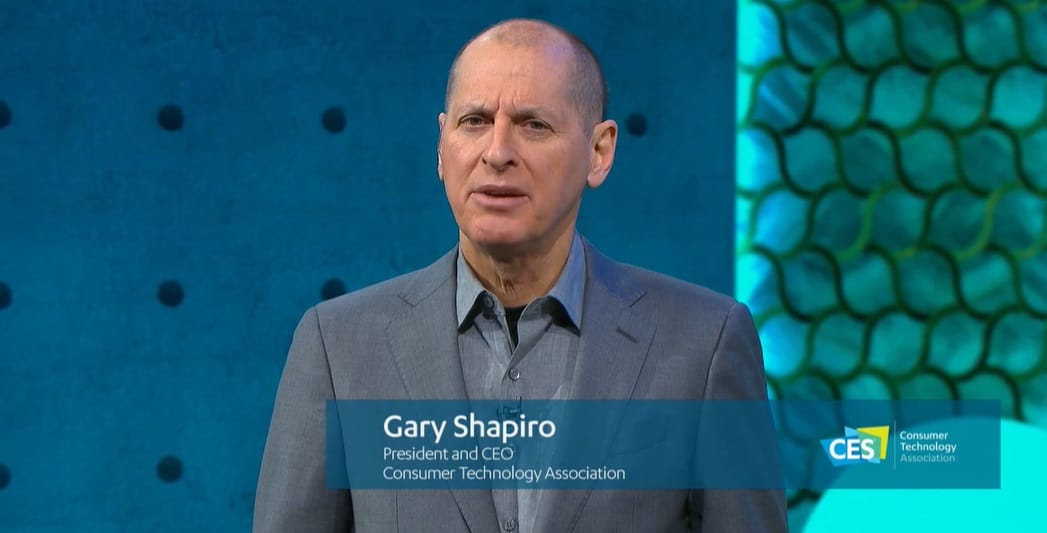Technology Still Has the Power to Make The World a Better Place, Gary Shapiro Says at CES 2021
January 12, 2021 – Technology still has the power to unite and to give, said Gary Shapiro, CEO of the Consumer Technology Association, at the start of 54th annual Consumer Electronics Show. While the year of 2020 has upended virtually everyone’s lives in ways never before seen, and in spite of the c
Derek Shumway

January 12, 2021 – Technology still has the power to unite and to give, said Gary Shapiro, CEO of the Consumer Technology Association, at the start of 54th annual Consumer Electronics Show.
While the year of 2020 has upended virtually everyone’s lives in ways never before seen, and in spite of the challenges brought on by the pandemic, Shapiro maintained that “tech will help solve more fundamental human problems in the next two decades than it has in the last two centuries.”
Microsoft CEO Satya Nadella joined the discussion with CTA Executive Vice President Karen Chupka and Shapiro, speaking about the important role Microsoft’s products including the Xbox, Teams, and Azure play in the home, at work, and for the community. Technology has been such a unifying force during the pandemic, Nadella said, and innovation is crucial to solve problems.
“The future of work will require more flexibility, how people collaborate and learn, and their wellbeing,” he said.
Shapiro emphasized that life will be better and safer for everyone with innovation. He particularly highlighted the need for high-speed broadband readily accessible in homes, acceleration of 5G deployment, and extending broadband to underserved and rural areas are serious needs that many find unity on.
The COVID-19 pandemic has also forced the health care industry to evolve and paved the way for telehealth to become a new norm, he said. He also noted the government’s role in technology innovation, specifically self-driving cars and contactless transportation. He called for government to set national rules to drive investment and deployment.
While political parties of any kind are difficult to please everyone, “innovation is bigger than one country or political party, and has the potential to lift everyone up,” said Shapiro.
In addition to calling for a more inclusive immigrant workplace, he referenced the incoming President-elect Joe Biden’s administration and highlighted the importance of having thoughtful, fact-based discussions about why tech is good with his new administration and in the internet of things as a whole.
AI will help solve challenges brought on by the pandemic
Other speakers in the opening session included Bridget Karlin, Global Chief Technology Officer at IBM and the new chair of CTA, Said $16 trillion will be added to the global economy by 2030 through artificial intelligence-fueled advancea in access to data and computing.
AI has solved some of the most challenging problems caused by COVID-19. For example, workers in supply chains are overextended and exhausted, increasing safety concerns. AI helps alleviate healthcare workers during the COVID-19 pandemic by targeting certain individuals for clinical trials, accelerating drug discovery, and advancing social and economic developments.
Two years ago, CTA announced plans to invest $10 million in venture firms and funds focused on women, people of color, and other underrepresented startups and entrepreneurs. Since then, five funds have seen investment. Shapiro announced that the newest fund to receive funding is Plum Alley, a New York based firm focused on healthcare companies.
Plum Alley CEO Deborah Jackson and President Andrea Turner Moffitt spoke about diversity and women in STEM. “Our vision for the future is that the next generation of hybrid technology and healthcare companies that go public or get acquired are founded by world class diverse teams,” they said. Jackson and Moffitt thanked the CTA for investing in and supporting women.
Chupka also recapped how, at CES 2020 last year, it launched the World Bank Global Tech Challenge. A series of programs and competitions designed to focus on healthcare and resilience and bridging the gender divide led to more than 1,000 applications, about 15 finalists were chosen. The two winners of this challenge were Butterfly Networks and Tricog, with Micromentor by Mercy Corps as winner of the gender challenge.











Member discussion